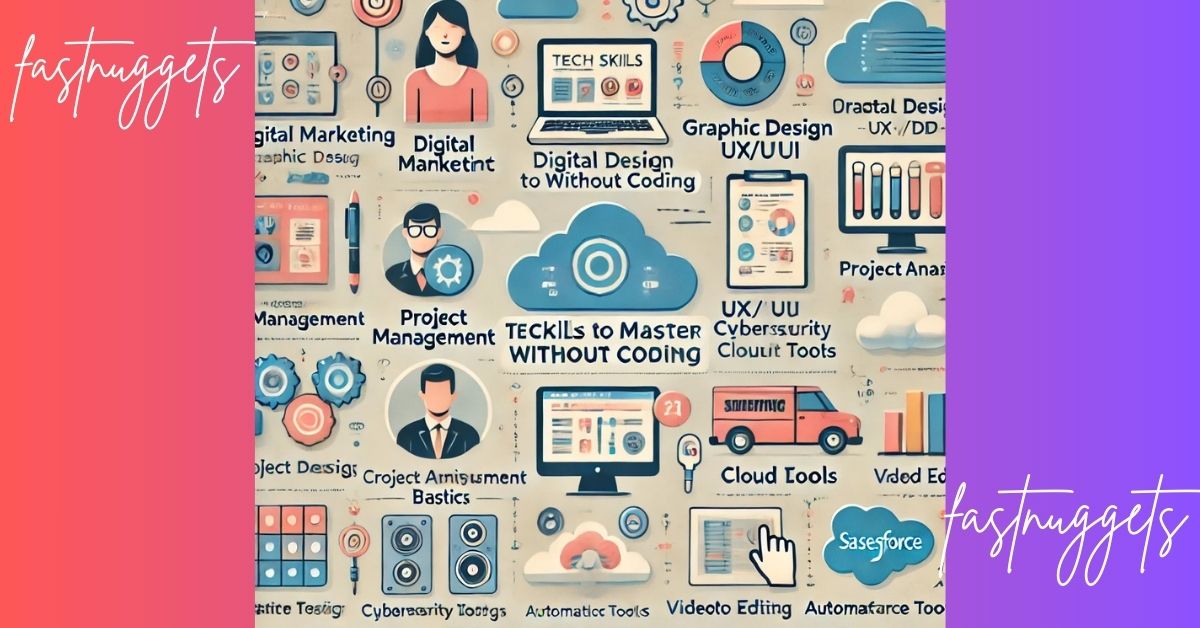When most people think of tech skills, they immediately picture programming languages, coding bootcamps, or endless lines of code. But here’s the truth: you don’t need to be a coder to thrive in tech. In 2025, the technology industry is bigger than coding alone. From design to data, marketing to product management, many high-paying, in-demand skills require little to no coding knowledge.
In this article, I’ll share the best tech skills you can learn without coding, why they matter, and how they can help you build a strong career in the digital world.
Why Learn Tech Skills Without Coding?
Coding is a valuable skill, but it’s not for everyone. Some people find it too technical, while others simply enjoy more creative, analytical, or strategic roles. The good news? Tech companies don’t just hire coders, they need designers, marketers, analysts, managers, and communicators to bring products to life.
Here are a few reasons why non-coding tech skills are worth learning:
- High demand – Employers need a wide range of talents beyond developers.
- Career flexibility – You can work in tech without being stuck behind code.
- Great salaries – Many non-coding roles pay six figures.
- Low barrier to entry – You can learn these skills faster than coding.
Top Tech Skills to Learn Without Coding in 2025
1. UI/UX Design
User Interface (UI) and User Experience (UX) design are essential for creating apps, websites, and software that people actually enjoy using.
- Why it’s valuable: Every digital product needs intuitive, user-friendly design. A bad interface can kill a product, no matter how good the code behind it is.
- What you’ll do: Design layouts, wireframes, prototypes, and test usability.
- Tools to learn: Figma, Adobe XD, Sketch, InVision.
- Career outlook: UX designers can earn $70,000–$120,000 annually.
If you’re creative and love problem-solving, this is the perfect path.
2. Data Analysis
Data is the new oil, and companies need analysts to extract insights from it. The good news is—you don’t need to be a data scientist or coder to start with data analysis.
- Why it’s valuable: Businesses use data to make smarter decisions. Analysts help turn raw numbers into strategy.
- What you’ll do: Collect, clean, and analyze data using simple tools.
- Tools to learn: Microsoft Excel, Google Analytics, Tableau, Power BI.
- Career outlook: Data analysts earn $60,000–$100,000 per year.
This is great for people who enjoy numbers, research, and business strategy.
3. Digital Marketing
Every company needs visibility, and digital marketers are the ones who make that happen. With billions of users online, digital marketing is one of the hottest skills right now.
- Why it’s valuable: Without marketing, even the best products won’t sell.
- What you’ll do: SEO, social media, paid ads, email campaigns, and content marketing.
- Tools to learn: Google Ads, Meta Business Suite, SEMrush, Mailchimp.
- Career outlook: Digital marketers earn $55,000–$110,000 per year.
If you’re good at communication and strategy, this field is a goldmine.
4. Product Management
Product managers (PMs) act as the bridge between tech, design, and business. They don’t write code, but they guide products from idea to launch.
- Why it’s valuable: Tech companies rely on PMs to align teams and deliver results.
- What you’ll do: Define product roadmaps, manage teams, and track performance.
- Tools to learn: Jira, Trello, Asana, Notion.
- Career outlook: Product managers often earn $90,000–$140,000 annually.
This is ideal if you love leadership, planning, and problem-solving.
5. Tech Sales (SaaS Sales)
Sales in the software world is a high-income, non-coding career. Known as SaaS (Software as a Service) sales, this role focuses on selling digital products to businesses.
- Why it’s valuable: Software companies live and die by revenue growth.
- What you’ll do: Build client relationships, demo products, and close deals.
- Tools to learn: Salesforce, HubSpot, LinkedIn Sales Navigator.
- Career outlook: Tech sales reps earn $70,000–$150,000+ with commission.
Perfect if you’re persuasive and enjoy working with people.
6. Cybersecurity (Non-Technical Roles)
Cybersecurity sounds like coding-heavy work, but not all roles require deep technical skills. Areas like security awareness training, compliance, and risk management are more about policies than programming.
- Why it’s valuable: Cybercrime is on the rise, and companies need protection.
- What you’ll do: Monitor security policies, train employees, ensure compliance.
- Tools to learn: Splunk, Wireshark (basic understanding), compliance frameworks.
- Career outlook: Cybersecurity analysts earn $75,000–$120,000 annually.
If you like safety, policies, and tech, this career is a strong fit.
How to Start Learning These Skills
The best part? You don’t need a computer science degree to start. Here are some easy steps to begin:
- Take online courses – Platforms like Coursera, Udemy, and LinkedIn Learning offer beginner-friendly programs.
- Get hands-on practice – Use free trials of tools like Figma, Tableau, or Google Analytics.
- Build a portfolio – Showcase your designs, analysis reports, or marketing campaigns.
- Stay updated – Tech evolves fast, so follow blogs, podcasts, and communities.
Conclusion
You don’t need to be a coder to have a successful tech career in 2025. With skills like UI/UX design, data analysis, digital marketing, product management, tech sales, and cybersecurity, you can thrive in the digital economy, without writing a single line of code.
The key is to pick a skill that matches your strengths, learn the right tools, and build real-world projects to showcase your expertise. Whether you’re creative, analytical, or people-oriented, there’s a tech career waiting for you.
.
